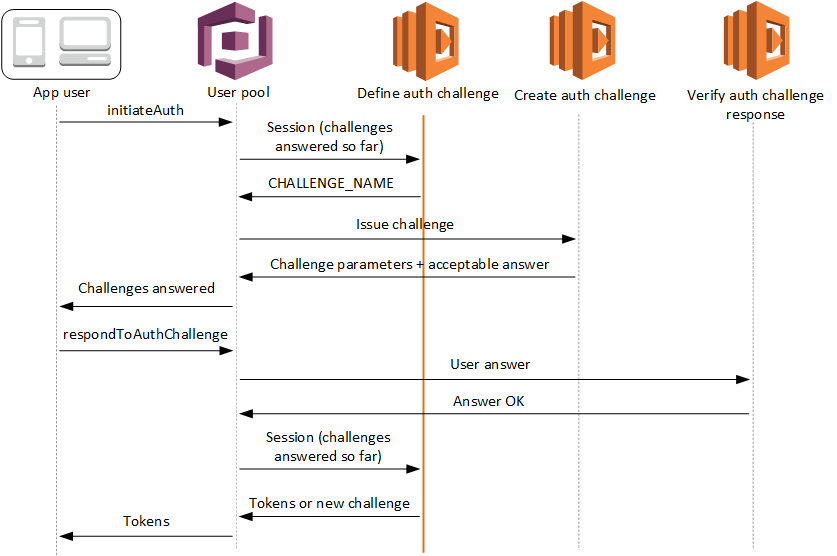Define Auth challenge Lambda trigger
The define auth challenge trigger is a Lambda function that maintains the challenge sequence in a custom authentication flow. It declares success or failure of the challenge sequence, and sets the next challenge if the sequence isn't yet complete.

- Define auth challenge
-
Amazon Cognito invokes this trigger to initiate the custom authentication flow.
The request for this Lambda trigger contains session. The session
parameter is an array that contains all of the challenges that are presented to the user in
the current authentication process. The request also includes the corresponding result. The
session array stores challenge details (ChallengeResult) in
chronological order. The challenge session[0] represents the first challenge
that the user receives.
Define Auth challenge Lambda trigger parameters
The request that Amazon Cognito passes to this Lambda function is a combination of the parameters below and the common parameters that Amazon Cognito adds to all requests.
Define Auth challenge request parameters
When Amazon Cognito invokes your Lambda function, Amazon Cognito provides the following parameters:
- userAttributes
-
One or more name-value pairs that represent user attributes.
- userNotFound
-
A Boolean that Amazon Cognito populates when
PreventUserExistenceErrorsis set toENABLEDfor your user pool client. A value oftruemeans that the user id (username, email address, and other details) did not match any existing users. WhenPreventUserExistenceErrorsis set toENABLED, the service doesn't inform the app of nonexistent users. We recommend that your Lambda functions maintain the same user experience and account for latency. This way, the caller can't detect different behavior when the user exists or doesn’t exist. - session
-
An array of
ChallengeResultelements. Each contains the following elements:- challengeName
-
One of the following challenge types:
CUSTOM_CHALLENGE,SRP_A,PASSWORD_VERIFIER,SMS_MFA,EMAIL_OTP,SOFTWARE_TOKEN_MFA,DEVICE_SRP_AUTH,DEVICE_PASSWORD_VERIFIER, orADMIN_NO_SRP_AUTH.When your define auth challenge function issues a
PASSWORD_VERIFIERchallenge for a user who has set up multifactor authentication, Amazon Cognito follows it up with anSMS_MFA,EMAIL_OTP, orSOFTWARE_TOKEN_MFAchallenge. These are the prompts for a multi-factor authentication code. In your function, include handling for input events fromSMS_MFA,EMAIL_OTP, andSOFTWARE_TOKEN_MFAchallenges. You don't need to invoke any MFA challenges in your define auth challenge function.Important
When your function is determining whether a user has successfully authenticated and you should issue them tokens, always check
challengeNamein your define auth challenge function and verify that it matches the expected value. - challengeResult
-
Set to
trueif the user successfully completed the challenge, orfalseotherwise. - challengeMetadata
-
Your name for the custom challenge. Used only if
challengeNameisCUSTOM_CHALLENGE.
- clientMetadata
-
One or more key-value pairs that you can provide as custom input to the Lambda function that you specify for the define auth challenge trigger. To pass this data to your Lambda function, you can use the
ClientMetadataparameter in the AdminRespondToAuthChallenge and RespondToAuthChallenge API operations. The request that invokes the define auth challenge function doesn't include data passed in the ClientMetadata parameter in AdminInitiateAuth and InitiateAuth API operations.
Define Auth challenge response parameters
In the response, you can return the next stage of the authentication process.
- challengeName
-
A string that contains the name of the next challenge. If you want to present a new challenge to your user, specify the challenge name here.
- issueTokens
-
If you determine that the user has completed the authentication challenges sufficiently, set to
true. If the user has not met the challenges sufficiently, set tofalse. - failAuthentication
-
If you want to end the current authentication process, set to
true. To continue the current authentication process, set tofalse.
Define Auth challenge example
This example defines a series of challenges for authentication and issues tokens only
if the user has completed all of the challenges successfully. When users complete SRP
authentication with the SRP_A and PASSWORD_VERIFIER
challenges, this function passes them a CUSTOM_CHALLENGE that invokes the
create auth challenge trigger. In combination with our create auth challenge
example, this sequence delivers a CAPTCHA challenge for challenge three and a
security question for challenge four.
After the user solves the CAPTCHA and answers the security question, this function confirms that your user pool can issue tokens. SRP authentication isn't required; you can also set the CAPTCHA and security question as challenges one & two. In the case where your define auth challenge function doesn't declare SRP challenges, your users' success is determined entirely by their responses to your custom prompts.